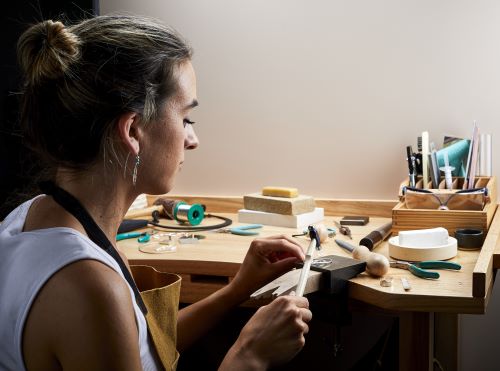If you’re considering selling your handmade jewellery and turning it into a business, you may be wondering whether you need certifications or licenses to sell in the UK. For most handmade jewellery makers, the requirements are straightforward. However, there are some rules and regulations you should be aware of to ensure you’re compliant with the law and to establish trust with your customers. Here’s a breakdown of what you need to know.
Hallmarking for Precious Metals
If your jewellery contains precious metals like gold, silver, platinum or palladium, UK law requires hallmarking if the metal content exceeds a certain weight:
- Gold: Over 1 gram
- Silver: Over 7.78 grams
- Platinum and Palladium: Over 0.5 grams
A hallmark is an official mark or series of marks stamped on precious metals to certify their content and purity. This is carried out by an Assay Office. Without a hallmark, it’s illegal to describe or sell your jewellery as being made from these precious metals above the weight thresholds. You can apply for hallmarking through one of the UK’s four Assay Offices.
Business Registration
If you’re selling jewellery as a business rather than a hobby, you’ll need to register as self-employed with HM Revenue & Customs (HMRC). This step ensures you’re paying the correct taxes on your earnings. Even if you’re only selling occasionally at markets or online, if your intent is to generate profit, you’ll need to register.
Insurance
While not a legal requirement, having insurance can protect you and your business. Consider taking out product liability insurance, which covers claims related to any harm caused by your jewellery. Public liability insurance is also a good idea if you sell at craft fairs or events.
Selling Online
If you sell handmade jewellery through your website or third-party platforms like Etsy, you must comply with UK distance selling regulations. This includes providing clear descriptions, pricing and refund policies for your customers.
Selling handmade jewellery in the UK doesn’t require extensive licensing or certifications, but it does involve understanding hallmarking laws, tax obligation and product safety standards. By following these guidelines, you’ll be well on your way to running a successful jewellery making business.

Sian Brown
Sian has been hand making her award winning jewellery in the West Midlands for over 12 years. Sian spent 10 years in Birmingham’s historic Jewellery Quarter before relocating to a quiet Worcestershire village.

